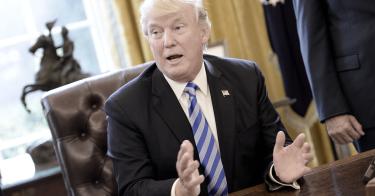President Donald Trump’s budget proposes a 28 percent cut, worth $17.3 billion, in the budget of the State Department and our foreign aid. Inevitably, liberals are opposed, but even some conservatives have expressed doubts. Yet if you believe in diplomacy, cuts are a good first step.
Recognize, first, that the 28 percent cut won’t happen. Presidential budget proposals bear only a vague connection to what we end up spending. At most, they indicate a direction of travel. They’re usually described as “dead on arrival,” and I doubt Trump’s budget will be different.
Financially, we should recognize, the State Department has had an excellent decade. As my colleague Brett Schaefer points out, the overall U.S. international affairs budget in 2015 was 60 percent higher, after inflation, than it was in 2005.
By contrast, defense spending — after a spike centered in 2010 — is now no higher than it was in 2005. We have not fed our military at the expense of our diplomats. If anyone has been starved for funds since 2010, it has been the Pentagon, not the State Department.
But that never stops the true believers, on both sides of the aisle, from claiming that the State Department doesn’t have enough money.
Rep. Eliot Engel (D-N.Y.) calls the proposed cuts “extremely dangerous and short-sighted.” Nothing has changed: In 2013, General James Mattis, now the secretary of defense, said, “if you don’t fund the State Department fully, then I need to buy more ammunition ultimately.”
The problem with this argument is that we have been funding the State Department very fully, and yet we still need to buy more ammunition. If you look around the world today, it’s hard to see how the large increases in our international affairs budget have paid dividends.
Part of the problem is that, while the U.S. military conducts after-action reviews, State doesn’t. Claims that giving State more money produces better results rest on hopes and anecdotes, not serious studies.
Our military does make mistakes, but it tries to learn from them. State needs to develop a similar culture of critical self-assessment. Today, it has a culture of budgetary entitlement, coupled with a lack of emphasis on rigorous, on-going training.
The other problem starts with the fact that State is largely divided into two sections: one that deals with regions (like East Asia) and one that deals with functions (like arms control).
Since 2005, the regional bureaus have shrunk, often drastically. East Asia is down from 1,582 people to 905 in 2015, and the Western Hemisphere from 2,230 to 1,063. That has entailed a serious loss of expertise in the affairs of other nations.
Yet over that time, State has grown by about 5,000 people – in part because the “functional” bureaus have multiplied. This is partly Congress’s fault: it loves mandating new missions. This failing was criticized as long ago as 2001 by the bipartisan Hart-Rudman Commission, and it has only become worse as State’s budget has risen.
And then there are our foreign-aid programs. As historian Mark Moyar argues, long-term foreign aid programs that emphasize educating future foreign leaders in the United States can be valuable.
But that is not what our aid budget does. And under President Barack Obama, U.S. assistance too often drifted into areas — like promoting transgender rights in Guatemala — that have no connection to our interests. Indeed, these efforts are likely to be gratuitously offensive in other cultures.
State needs to be adequately funded. But it also needs a cultural change and to return to its core business of bilateral diplomacy. Aid, meanwhile, needs to drop the trendy causes and focus on what works.
Cuts alone won’t make that happen. But trimming back some excesses funded by the recent spending spree is a reasonable first step toward returning our focus where it belongs: on the serious business of using our diplomacy and foreign aid to benefit the United States.
This piece originally appeared in Newsday



